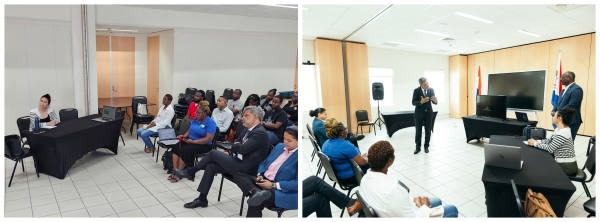 PHILIPSBURG:--- Government officials, heritage experts, and archival stakeholders gathered at the Government Administration Building to reaffirm a shared commitment to preserving St. Maarten’s documentary heritage. The gathering on Friday, which centered around the progress of the “Echoes of Memory – Preserve” project, marked a critical step forward in the island’s efforts to safeguard historical records, modernize archival infrastructure, and create a sustainable national preservation strategy.
PHILIPSBURG:--- Government officials, heritage experts, and archival stakeholders gathered at the Government Administration Building to reaffirm a shared commitment to preserving St. Maarten’s documentary heritage. The gathering on Friday, which centered around the progress of the “Echoes of Memory – Preserve” project, marked a critical step forward in the island’s efforts to safeguard historical records, modernize archival infrastructure, and create a sustainable national preservation strategy.
The initiative is a collaboration between Kadaster St. Maarten, the Royal Netherlands Institute of Southeast Asian and Caribbean Studies (KITLV), and key local partners. Kadaster Director Benjamin Ortega officially unveiled the project name, emphasizing the symbolic significance of “Echoes of Memory – Preserve.” “It reminds us that preserving our past is a collective responsibility,” he stated. “Without proper legislation and a secure, climate-controlled facility, our heritage remains at risk. We must act now.”
Ortega highlighted two major obstacles: the lack of adequate legislation and the absence of a proper archival facility. He thanked the Supervisory Board of Kadaster for their commitment to institutional progress and stressed the importance of sound governance and a structural preservation plan currently being developed.
KITLV Science Communication Coordinator and researcher Daniella Britt shared insights from her recent fieldwork on the island. Over the past month, she engaged with heritage professionals and stakeholders to better understand the local preservation context.
Her presentation addressed four critical areas: the value of documentary heritage, the current state of archives in St. Maarten, key challenges, and potential next steps. She emphasized that for St. Maarten, the preservation of documentary heritage is not a theoretical exercise but an urgent necessity, especially in light of past natural disasters. She referenced deteriorating records stored in unsuitable containers, underscoring the ongoing vulnerability of valuable documents.
Britt noted that Caribbean-specific knowledge is vital to developing a successful strategy. “Local expertise must be the cornerstone of our efforts,” she said, while outlining steps for targeted consultation, capacity building, and infrastructure development. She introduced a preservation framework that highlights environmental threats including heat, humidity, insects, and hurricanes as constant risks in the tropics.
Among the most fragile materials identified were historical land deeds dating back to the era of slavery documents that reveal vital social and economic aspects of the island’s past. These, Britt warned, will continue to deteriorate without urgent intervention.
Prime Minister Dr. Luc Mercelina delivered a passionate and thought-provoking address that captured both the urgency of the moment and a bold vision for the future. “Standing here today, I don’t feel lost, I feel the weight of responsibility,” he said. “Because this is what nation-building truly demands: institutions that anchor our identity and drive our independence. A National Archive, a National Library, a Police Academy, a Development Bank these are not luxuries; they are the bedrock of a country that knows where it’s been and where it’s going.”
While commending the collective expertise in the room, the Prime Minister also issued a clear call to action: “Goodwill is not a strategy. We keep saying we will commit but too often, we leave the room and leave the work behind. That must end today. Let us make this the turning point where intent becomes action and vision becomes legacy. As Prime Minister, I see my role not as a gatekeeper, but as a facilitator—ready to unlock the doors that have long been closed to our progress.”
He further reflected on the constraints of reactive governance, stating: “We spend our days putting out fires and our nights dreaming of progress. When do we carve out the time to actually build the future? We rarely get two uninterrupted hours to think boldly, to plan strategically—and that absence of vision has kept us stuck. The National Archive is not just a collection of papers—it is the spine of our national story. It’s time we give it the priority and protection it deserves.”
Minister of Education, Culture, Youth and Sports (ECYS), Hon. Melissa Gumbs, expressed appreciation for the collaborative energy in the room. She praised the collective institutional memory, research, and passion shared by all present. “This gathering proves we are not starting from zero. We are building on foundations laid by dedicated individuals across generations,” she said.
Minister Gumbs also reaffirmed her Ministry’s commitment to working with Kadaster and other stakeholders to develop a realistic, actionable preservation plan.
UNESCO Secretary-General for St. Maarten, Marcellia Henry, closed the session with a vote of thanks, applauding the participants for their dedication to the nation’s heritage. She reaffirmed UNESCO’s ongoing partnership with Kadaster and other local entities in ensuring St. Maarten’s documentary legacy is protected and elevated. Henry stressed the importance of digitization, modern preservation techniques, and capacity-building to ensure long-term access and resilience.
As the “Echoes of Memory – Preserve” project gains momentum, stakeholders have made it clear: this is not just a technical mission—it is a moral imperative. The future of St. Maarten’s identity, history, and cultural resilience depends on how decisively the nation responds today.










